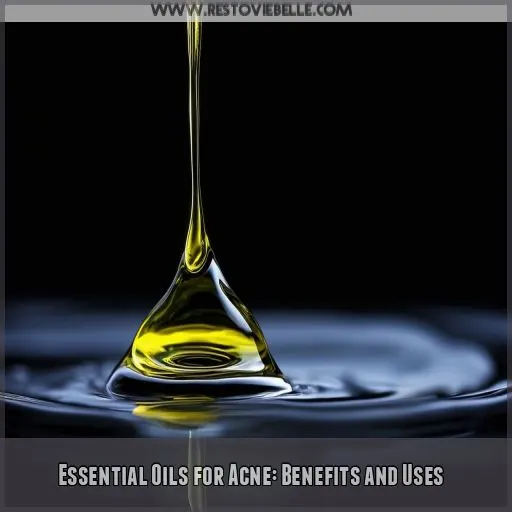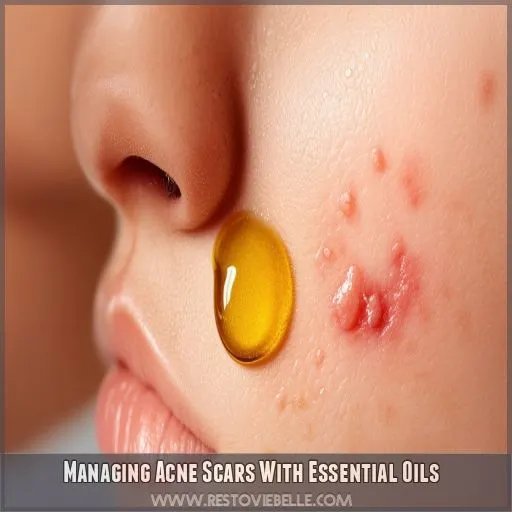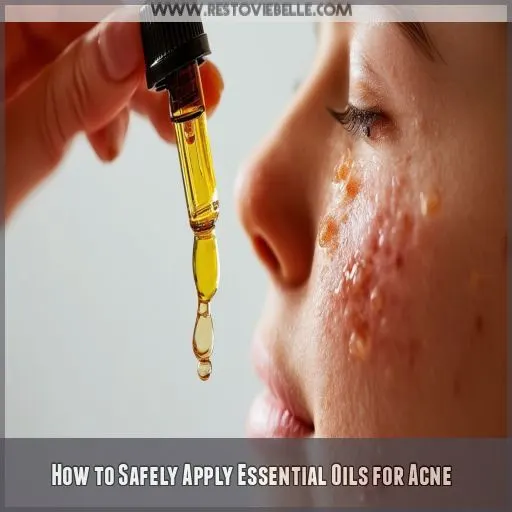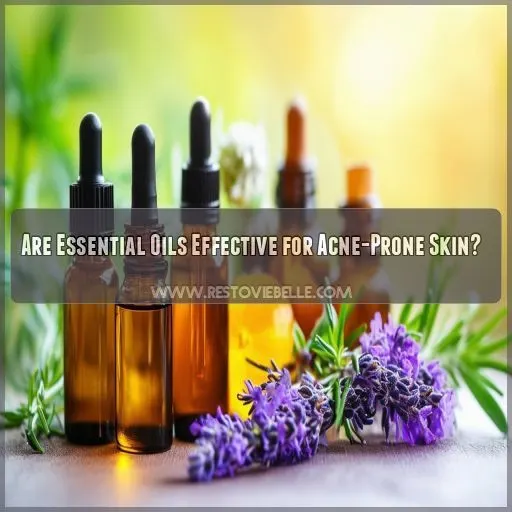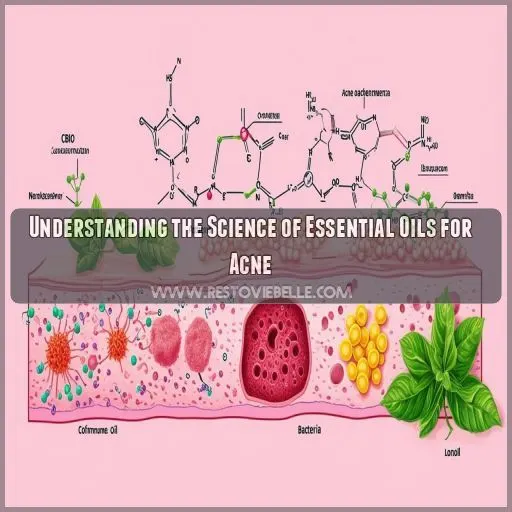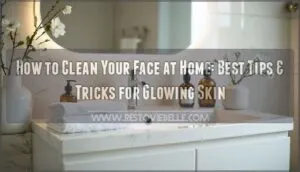This site is supported by our readers. We may earn a commission, at no cost to you, if you purchase through links.
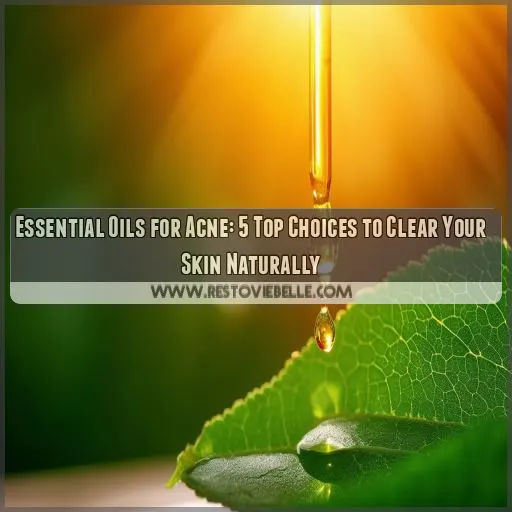
In this article, you’ll discover the top 5 essential oils for acne that can help you achieve clearer, healthier-looking skin. Learn how to harness their antibacterial and anti-inflammatory properties to take control of your complexion.
Get ready to reveal the potential of these natural remedies and master your skincare routine.
Table Of Contents
- Key Takeaways
- Essential Oils for Acne: Benefits and Uses
- Managing Acne Scars With Essential Oils
- How to Safely Apply Essential Oils for Acne
- Are Essential Oils Effective for Acne-Prone Skin?
- Understanding the Science of Essential Oils for Acne
- Frequently Asked Questions (FAQs)
- What essential oils are best for acne?
- What oil is best for acne prone face?
- Which carrier oil is best for acne?
- What are the best oils for clear skin?
- Can essential oils be used with prescription acne medications?
- How long does it take to see results?
- Are some essential oils better for specific acne types?
- Can essential oils prevent future acne breakouts?
- Are there any age restrictions for using essential oils?
- Conclusion
Key Takeaways
- Nature’s acne-fighting squad is here, and they’re packing some serious punch! Tea tree, lavender, and rosemary oils are leading the charge against those pesky pimples with their antibacterial superpowers.
- Don’t go in guns blazing – always dilute those potent plant juices with a carrier oil like jojoba. Your skin will thank you for not declaring all-out war on its delicate ecosystem.
- Patience is a virtue, especially when it comes to clear skin. Give those oils 2-4 weeks to work their magic before expecting a total complexion transformation. Rome wasn’t built in a day, and neither is flawless skin!
- Essential oils aren’t just one-trick ponies. They’re multitasking marvels that can help fade those battle scars left behind by acne. Rosehip seed oil is the unsung hero in this department – it’s like a time machine for your skin!
Essential Oils for Acne: Benefits and Uses
Essential oils offer a natural approach to managing acne, with benefits ranging from antimicrobial properties to reducing inflammation. You’ll find several effective options, including tea tree, lavender, and rosemary oils, each with unique properties that can help combat acne-causing bacteria and soothe irritated skin.
Benefits and Uses
Essential oils offer a natural approach to fighting acne. These concentrated plant extracts boast antimicrobial and anti-inflammatory properties that can help combat acne-causing bacteria and soothe irritated skin.
When used properly, they’re a gentler alternative to harsh chemicals. You’ll need to dilute them with carrier oils for safe application.
Top Oils For Acne
Now that you understand the benefits, let’s explore the top essential oils for acne.
Tea tree oil stands out for its powerful antibacterial properties, effectively combating acne-causing bacteria. Lavender soothes inflammation, while rosemary and thyme destroy P. acnes. Cinnamon and oregano also show promising results.
Application Methods And Safety
Now that you’ve chosen your essential oils, it’s important to apply them safely.
Always dilute EOs with a carrier oil like jojoba or almond to prevent skin irritation. Start with a patch test on your inner arm to check for sensitivity.
For acne treatment, mix 1-2 drops of EO with 10 drops of carrier oil.
Effectiveness Versus Medications
While essential oils offer a natural approach to acne treatment, their effectiveness compared to conventional medications is still debated. Here’s what you need to know:
- Limited clinical trials: Few long-term studies compare essential oils to standard acne treatments.
- Placebo effects: Some benefits may be due to the soothing application process rather than the oils themselves.
- Ingredient interactions: Essential oils might complement or interfere with other acne treatments.
You’re empowering yourself by exploring natural sources of medicine, but remember to consult a dermatologist for personalized advice.
Managing Acne Scars With Essential Oils
Essential oils can be powerful allies in managing acne scars, with rosehip seed oil leading the charge. You’ll find that helichrysum, rose, and lavender oils also support skin regeneration, helping to smooth and refine your complexion over time.
Role of Rosehip Seed Oil
Rosehip seed oil is your secret weapon against acne scars. Packed with anti-inflammatory properties, it’s a natural powerhouse.
You’ll love its high content of linoleic acid, vitamin A, and vitamin C, which work together to fade those pesky marks.
Try adding a few drops to your nightly face mask for an extra boost.
It’ll improve your sleep quality too, making it a fantastic alternative to harsh treatments.
Helichrysum, Rose, and Lavender for Skin Regeneration
You’ll find that helichrysum, rose, and lavender are powerful allies in your battle against acne scars. These essential oils work synergistically to boost skin regeneration.
Helichrysum’s effectiveness lies in its ability to fade old scars, while rose excels at scar reduction. Lavender’s inflammation-reducing properties soothe your skin.
Don’t expect overnight miracles, though – skin regeneration timeframes vary, but consistent use can yield impressive results.
How to Safely Apply Essential Oils for Acne
When using essential oils for acne, it’s imperative to dilute them adequately with carrier oils to prevent skin irritation. You can apply the diluted mixture as a spot treatment or integrate it into a DIY face mask for a more extensive approach to combating acne.
Dilution With Carrier Oils
When using essential oils for acne, dilution is key. You’ll want to mix them with carrier oils to protect your skin.
Choose non-comedogenic options like jojoba or grapeseed oil.
Start with a 2% dilution ratio: that’s 12 drops of essential oil per ounce of carrier oil.
Always patch test before applying to your face, and store your mixtures in dark glass bottles to extend their shelf life.
Spot Treatment and DIY Face Mask Techniques
Ready to take control of your acne? Try these spot treatment and DIY face mask techniques:
- Spot treatment: Mix 1 drop essential oil with 10 drops carrier oil, then dab on blemishes with a Q-tip.
- Clay mask: Blend 1 tablespoon bentonite clay, 1 drop tea tree oil, and water until smooth.
- Honey mask: Combine 1 tablespoon raw honey with 2 drops lavender oil for a soothing treatment.
These natural remedies empower you to master your skincare routine and liberate your complexion.
Are Essential Oils Effective for Acne-Prone Skin?
You might wonder if essential oils can effectively address acne-prone skin concerns. While some studies show promise, it’s important to compare their efficacy to traditional acne treatments before fully relying on them for your skincare routine.
Addressing Acne Prone Skin Concerns
If you’re battling acne-prone skin, essential oils might be your secret weapon. These potent plant extracts pack a punch with their antibacterial and anti-inflammatory properties.
But proceed with caution – skin irritation risks are real. Always perform a patch test and dilute with a carrier oil.
When used correctly, essential oils can be effective allies in your fight against stubborn breakouts, offering a natural alternative to harsh chemicals.
Comparing Essential Oils to Traditional Treatments
While essential oils can be effective for mild acne, they don’t match the potency of traditional treatments for severe cases.
Prescription drugs often yield quicker results but come with potential side effects. Essential oils offer a gentler approach, balancing skin without harsh chemicals.
Your choice depends on your acne severity and personal preferences. Remember, what works for one might not work for another.
Understanding the Science of Essential Oils for Acne
While essential oils show promise for acne treatment, it’s imperative to understand the science behind their effectiveness. These potent plant extracts work by targeting acne-causing bacteria and reducing inflammation. Here’s how they pack a punch against pesky pimples:
- Antibacterial properties: Many essential oils, like tea tree and oregano, have strong antimicrobial effects that can zap acne-causing bacteria.
- Anti-inflammatory action: Oils such as lavender and chamomile help calm angry, red skin and reduce swelling.
- Sebum regulation: Some oils, like geranium and frankincense, may help balance oil production in your skin.
Frequently Asked Questions (FAQs)
What essential oils are best for acne?
You’ll find tea tree, lavender, and rosemary oils effective for acne. They’re antibacterial and anti-inflammatory powerhouses. Don’t forget clary sage and oregano – they’re unsung heroes in the fight against pesky pimples. Always dilute before applying!
What oil is best for acne prone face?
Like a soothing balm for troubled skin, tea tree oil reigns supreme. You’ll find it’s your best ally against acne. Dilute it with a carrier oil, apply sparingly, and watch your complexion transform. It’s nature’s acne-fighting powerhouse.
Which carrier oil is best for acne?
You’ll find jojoba oil’s your best bet for acne-prone skin. It’s lightweight, non-comedogenic, and mimics your skin’s natural sebum. Plus, it’s got anti-inflammatory properties that’ll help calm those pesky breakouts. Give it a try!
What are the best oils for clear skin?
You’ll love these oils for clear skin: jojoba, tea tree, and rosehip. They’re powerhouse acne-fighters that’ll give you that glow-up you’ve been craving. Use them regularly, and you’ll be showing off your flawless complexion in no time!
Can essential oils be used with prescription acne medications?
Mixing essential oils with prescription acne meds can be risky. You’ll want to consult your dermatologist first. They’ll guide you on potential interactions and help tailor a safe, effective skincare routine that won’t compromise your treatment.
How long does it take to see results?
You’ll typically see results within 2-4 weeks of consistent use. However, everyone’s skin is unique, so patience is key. Stick with your routine and adjust as needed. Remember, lasting improvements take time and dedication.
Are some essential oils better for specific acne types?
Picture a garden with diverse plants, each suited to different soils. Similarly, essential oils target specific acne types. Tea tree combats oily skin, while lavender soothes inflammation. You’ll find the right oil for your unique skin "soil.
Can essential oils prevent future acne breakouts?
You can potentially prevent future breakouts by using essential oils regularly. They’ll combat bacteria, reduce inflammation, and balance your skin’s oil production. However, consistency is key, and you should combine them with a thorough skincare routine for best results.
Are there any age restrictions for using essential oils?
While there’s no strict age limit, you’ll want to be cautious with kids and seniors. Always dilute oils properly and consult a healthcare provider, especially for children under 12, pregnant women, and older adults.
Conclusion
Who knew that the secret to clear skin was hiding in your hippie aunt’s essential oil collection?
Jokes aside, essential oils for acne offer a natural approach to managing breakouts and scars.
By understanding their benefits, application methods, and scientific backing, you’re equipped to make informed choices for your skincare routine.
Whether you opt for tea tree, lavender, or rosehip seed oil, remember to dilute properly and patch test.
With patience and consistency, you might just find your skin’s new best friend in these potent plant extracts.

